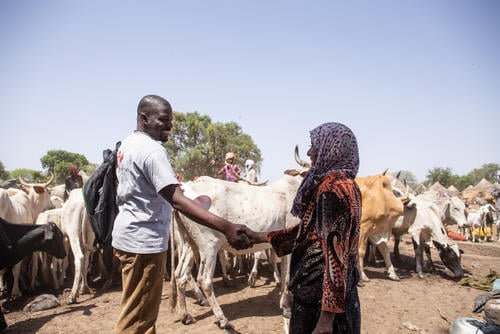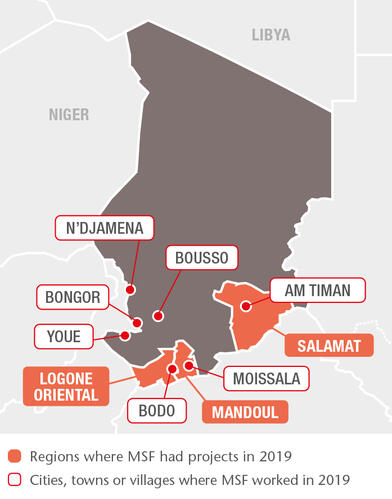
352,500
352,5
154,800
154,8
109,900
109,9

11,300
11,3
5,600
5,6
In Chad, measles outbreaks usually begin in spring and die out when the rainy season starts in June, but the 2018 outbreak continued into 2019 and eventually spread to 75 of the country’s 126 districts.
Our teams arrived in Am Timan in January when a new peak was declared. In four weeks, we vaccinated 107,000 children in the city and 13 other locations across the district. We also helped to manage measles patients in Am Timan hospital and three health centres.
In the capital, N’Djamena, we converted our inpatient feeding centre, which was originally set up for a one-off emergency intervention in 2018, into a measles unit to provide care for the most severely affected children. We also supported 21 health centres to treat patients in the city.
In Bongor, Bousso, Ba’illi and Kouno districts, in the southwest of the country, and Bodo district, in the south, we vaccinated over 245,000 children, and supported five hospitals and 66 health centres to treat patients. In Bodo district, where measles was not the only life-threatening disease affecting children under five years of age, we provided treatment for malaria and acute malnutrition.
Responding to other emergencies
Malnutrition is endemic in the Sahel, the strip of land that runs across the middle of Chad. In recent years, several factors have exacerbated the prevalence and incidence of malnutrition, including severe seasonal food insecurity, a general lack of purchasing power and the deepening economic crisis.
Measles and malnutrition together are a deadly combination: measles can worsen a child’s nutritional status, while low immunity caused by malnutrition increases the severity of measles and even the risk of death.
In N’Djamena, the few facilities offering treatment for severe malnutrition were again overwhelmed from June to September by large numbers of patients. In response, we reopened an MSF-run inpatient feeding centre in the N’Djari neighbourhood. By the time we closed the centre in October, we had treated 970 children with severe malnutrition and medical complications.
In the southwest of the country, we also responded to a meningitis outbreak, treating over 750 children, 245 of whom received care at Goundi hospital from January to April 2019.
Improving mother and child healthcare in Moissala
In 2019, our teams treated over 90,600 children for malaria in MSF-supported health facilities in Moissala, in southern Chad. Of those, nearly 7,000 were admitted to Moissala hospital paediatric wards for severe malaria. We also decided to expand our activities in the area to improve access to health services for women and children at all levels, from community health centres up to inpatient care. During the year, we supported operating theatres, maternity, paediatric and neonatology wards in Moissala hospital and obstetric care in two health centres.

















